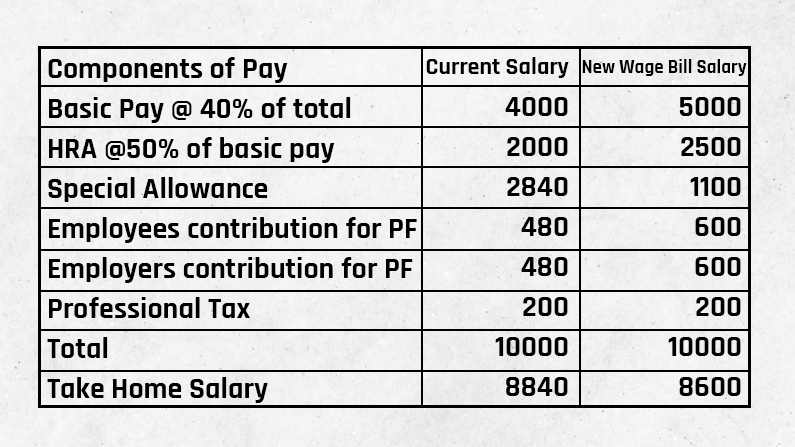Here is how the new wage code will impact your take-home package
Take-home salary may come down
- Harsh Chauhan
- Last Updated : February 10, 2021, 18:32 IST

Government’s new compensation rules part of Code on Wages passed by Parliament in August 2019 will be effective from April 2021. Here is how the new set of rules impact your take-home pay as companies change the salary structure to adhere to the new wage bill.
Definition of wages
The definition of ‘wages’ under the new code includes all remuneration but excludes certain allowances and benefits such as house rent allowance, overtime allowance, statutory bonus, employer contribution to provident fund/pension etc. If the value of exclusions exceeds 50% of the total wages, then the excess amount would be included in the wages. Value of remuneration in kind is also to be included up to 15% of the total wages.
Usually, most companies keep less than 50% of the non-allowance part of the employee’s salary so that they have to contribute less to EPF and gratuity and reduce their burden. But after the new pay code is implemented, companies will have to increase the basic salary.
The maths
Let’s suppose your current salary is ₹10,000 a month, and the basic salary is ₹4,000. That means, your salary reaches ₹10,000 by taking into account allowances, etc. So, the employee and the company contributed PF at 12-12% comes to Rs 960. This makes your take-home salary Rs 8,840. We are assuming only professional tax deduction and no other deductions in our calculation.
With the new wage bill coming into pay, the basic salary will go up to ₹5,000. Therefore the total PF contribution will go up by ₹240 to ₹1,200. And this will reduce your take-home salary to ₹8,600 a month, which is ₹240 less than the previous salary.
In a nutshell, while the new wage code decreases the take-home salary of an employee but increases the PF contribution. This might impact you in the near term but in the long run, it will help build a larger retirement corpus.
Download Money9 App for the latest updates on Personal Finance.
Related
- Labour groups demand special fund for informal sector in Budget’24
- Budget 2024 may increase PF limit after 10 years
- Govt makes major reform in EPS pension scheme
- Has your PF been credited to your account? Here’s how to check
- EPFO eases rules for verification, withdrawal
- Gratuity payment: Who gets it and how much?


